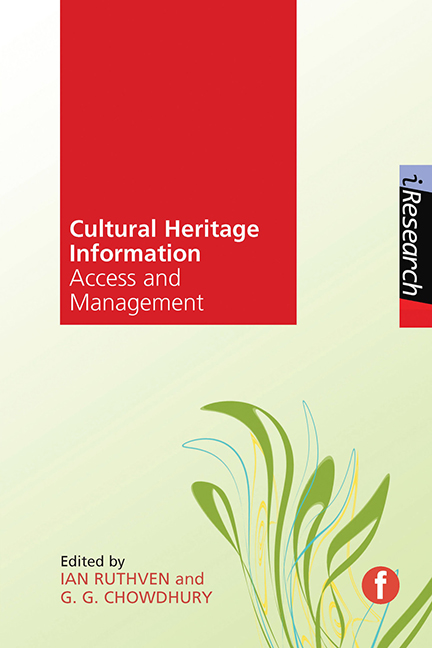Book contents
- Frontmatter
- Contents
- List of figures and tables
- Contributors
- Preface
- 1 Managing digital cultural heritage information
- 2 Digital humanities and digital cultural heritage (alt-history and future directions)
- 3 Management of cultural heritage information: policies and practices
- 4 Cultural heritage information: artefacts and digitization technologies
- 5 Metadata in cultural contexts – from manga to digital archives in a linked open data environment
- 6 Managing cultural heritage: information systems architecture
- 7 Cultural heritage information: users and usability
- 8 A framework for classifying and comparing interactions in culturalheritage information systems
- 9 Semantic access and exploration in cultural heritage digital libraries
- 10 Supporting exploration and use of digital cultural heritage materials: the PATHS perspective
- 11 Cultural heritage information services: sustainability issues
- Index
11 - Cultural heritage information services: sustainability issues
Published online by Cambridge University Press: 10 September 2022
- Frontmatter
- Contents
- List of figures and tables
- Contributors
- Preface
- 1 Managing digital cultural heritage information
- 2 Digital humanities and digital cultural heritage (alt-history and future directions)
- 3 Management of cultural heritage information: policies and practices
- 4 Cultural heritage information: artefacts and digitization technologies
- 5 Metadata in cultural contexts – from manga to digital archives in a linked open data environment
- 6 Managing cultural heritage: information systems architecture
- 7 Cultural heritage information: users and usability
- 8 A framework for classifying and comparing interactions in culturalheritage information systems
- 9 Semantic access and exploration in cultural heritage digital libraries
- 10 Supporting exploration and use of digital cultural heritage materials: the PATHS perspective
- 11 Cultural heritage information services: sustainability issues
- Index
Summary
Introduction
A number of cultural heritage information services have appeared over the past decade or so. Some of these services are offered as part of national library services, like the American Memory from the US Library of Congress, or as an initiative of several memory institutions and industries, such as the Europeana digital library. As discussed in Chapter 3, activities related to the development of such digital libraries of cultural heritage information are very resource-intensive – not only to begin with, for example because of the massive cost of digitization and processing of digital information, but also in the longer term, for preservation of digitized heritage content that is required to ensure future access. Therefore, cultural heritage information services require a continuous funding support, and so the economic sustainability of such services is a major issue. However, economic sustainability is not the only challenge for digital cultural heritage information services. There are a number of social and environmental sustainability challenges as well.
Social sustainability issues of digital cultural heritage information services may be associated with a number of factors, such as the users’ accessibility to ICT and web, usability of information systems and services, and information behaviour and literacy of users. Other social sustainability issues include copyright and digital rights management regulations; international, national and local or institutional policies and practices with regard to information products and services; and some specific cultural issues, for example those that are associated with indigenous cultural heritage information. Some of these issues have been discussed in Chapter 3.
Cultural heritage information services make extensive use of ICT throughout their lifecycle – from digitization to indexing, management, access and preservation. Research (Baliga et al., 2009, 2011; Mell and Grance, 2011; Chowdhury 2014a, 2014b) shows that the use of ICT causes a significant amount of greenhouse gas emissions because of the energy required for manufacturing computing equipment and network infra-structure, and also the energy required for use of these devices for building and running various information systems and services. Hence, specific measures need to be taken for building green information systems and services that make more efficient use of ICT and thus are environ mentally sustainable (Chowdhury, 2012a, 2012b, 2012c, 2013a, 2013b, 2014a, 2014b). This chapter discusses the economic, social and environmental sustainability of cultural heritage information systems and services.
- Type
- Chapter
- Information
- Cultural Heritage InformationAccess and Management, pp. 221 - 246Publisher: FacetPrint publication year: 2015
- 2
- Cited by



